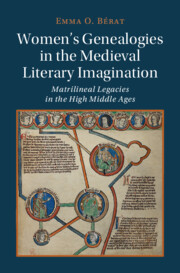 Women's Genealogies in the Medieval Literary Imagination
Women's Genealogies in the Medieval Literary Imagination Landmarks in Audrée, Osith, and Modwenne
Published online by Cambridge University Press: 14 March 2024
The landscape – both its natural landmarks and architecture – serves as a public space of women’s genealogical record in the thirteenth-century Anglo-Norman lives of Audrée, Osith, and Modwenne, contained in the Campsey manuscript, with all three texts invested in women’s kinships, succession, land uses, and geographical movement. This chapter explores how landmarks caused by the protagonists’ intimate, direct interaction with the land – here called “contact landmarks” – offer material proof of women’s legacies that do not involve, and even reject, biological or sexual relations. As Audrey, Osith, and Modwenna resist marriage and motherhood, they inscribe rock faces and church doors, create springs and islands, and inhabit transient water spaces, like rivers and pools, creating claims to space and time that reflect their independent lives and legacies. These landmarking acts are compared to descriptions of outdoor births and land-oriented birth visions in high medieval chronicles and hagiography and discussed in relation to Isabella of Arundel, a landowning widow who perhaps commissioned the manuscript.
To save this book to your Kindle, first ensure [email protected] is added to your Approved Personal Document E-mail List under your Personal Document Settings on the Manage Your Content and Devices page of your Amazon account. Then enter the ‘name’ part of your Kindle email address below. Find out more about saving to your Kindle.
Note you can select to save to either the @free.kindle.com or @kindle.com variations. ‘@free.kindle.com’ emails are free but can only be saved to your device when it is connected to wi-fi. ‘@kindle.com’ emails can be delivered even when you are not connected to wi-fi, but note that service fees apply.
Find out more about the Kindle Personal Document Service.
To save content items to your account, please confirm that you agree to abide by our usage policies. If this is the first time you use this feature, you will be asked to authorise Cambridge Core to connect with your account. Find out more about saving content to Dropbox.
To save content items to your account, please confirm that you agree to abide by our usage policies. If this is the first time you use this feature, you will be asked to authorise Cambridge Core to connect with your account. Find out more about saving content to Google Drive.